
PUMPA - SMART LEARNING
எங்கள் ஆசிரியர்களுடன் 1-ஆன்-1 ஆலோசனை நேரத்தைப் பெறுங்கள். டாப்பர் ஆவதற்கு நாங்கள் பயிற்சி அளிப்போம்
Book Free DemoThis is an imaginative story set in a time period where the world had just begun. Animals had to work for humans, and humans fed the animals in turn. Humans had just started domesticating animals. There was a camel that lived in the middle of a desert. The author refers to the desert as "Howling Desert" because he means it is very lonely and deserted. Since there is no sound of any livelihood, only the desert winds were heard like a howl. The camel lived by himself because he did not like to work. One might wonder what he will do for food. The camel ate sticks, thorns and prickles that were easily available around him. Deserts are known for thorny plants like cactus, and usually, animals find it hard to eat them. But the camel was so lazy that he was ready to eat it and remain without doing any work. If someone came and spoke to him, the only answer he gave as "Humph". This was the answer for any question that anyone asked him.
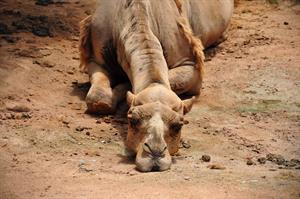
The lazy, lonely camel.
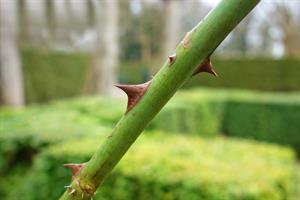
The camel ate sticks, thorns, prickles that he found.
Once a horse came up to him on a Monday morning. He had a seat fastened on his back for the rider to sit on, called a saddle. This meant horses were used to carry people from one place to another, as a means of transport. The horse asked the camel to come out and start running like the rest of them.
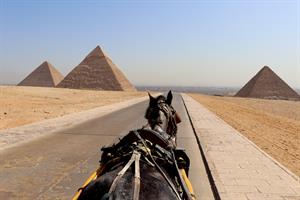
Horse, with the saddle - went off to his master.
The camel gave his usual reply, "Humph" and the horse went off to tell the man about the camel.
Next came along a dog, with a stick in its mouth. He also asked the camel to go along with him, to carry and bring goods like the other animals.
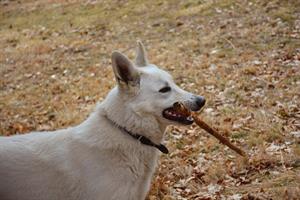
The dog also returned to complain to his master.
As we already know, the camel only replied "Humph". The dog also went to the man to complain about the camel.
Then an ox came to the camel, to try to make the camel do some work. The ox had a wooden instrument fastened over its neck. This will be usually attached to the plough or the cart that ox pulls when they plough the fields.
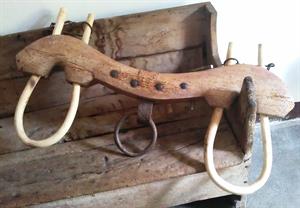
Yoke, fastened on ox's neck, to facilitate ploughing.
He asked the camel to go and plough like the other animals. The camel again replied "Humph". The ox returned to the man to complain.
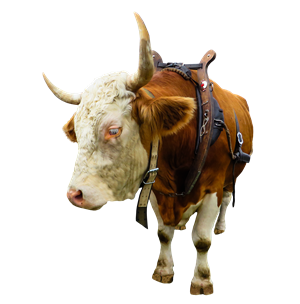
The ox also returned to the man.
The "Man" or the master called all the three animals - horse, dog and ox together. He told them that he felt very sorry for them as the "Humph-thing" in the desert cannot do any work; if he could, he would have appeared for duty. The man refers to the camel as "Humph-thing" because all it does the whole day is humph-ing. It does not do any other work, so maybe he is not sure whether the animal is a camel or not! He further told the three animals that since the camel cannot do any work, he was about to divide the work amongst them, and therefore they must work twice their work time to cover up the duties of the camel.
The three animals got very angry, and they decided to hold a village council meeting where they discussed the problem and a solution has arrived. The meet was held on the edge of the desert. The camel came there chewing cud. (Cud refers to partly digested food that animals bring back from the stomach and chew further). He said "humph" again and went away.
Then there came along the Djinn who was in charge of all the happenings in the deserts. Since he is a supernatural character, he comes rolling in a smoky cloud filled with dust. Djinn is pronounced as jin, genie, genii etc. It refers to a supernatural character; it is a spirit that has unique powers and can take any form (humans or animals).
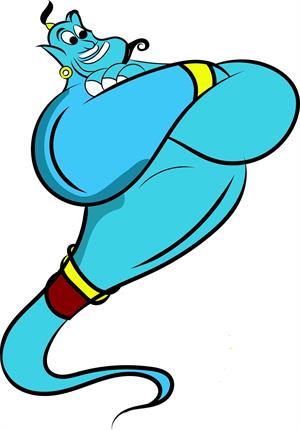
The Djinn
As soon as the Djinn appeared, the horse asked the Djinn, whether it was right for anyone to be idle.
The Djinn said it was definitely not right for anyone to sit idle.
The horse asked him about the camel; he said there was a thing in the middle of the desert and that he had a long neck and long legs. The horse complained that the thing had not done any work since Monday morning; nor did he move.
The Djinn immediately realized it was the camel that the horse was talking about. The Djinn asked the horse what the camel said when they asked.
The ox replied that the camel said "Humph" and that we wouldn't plough.
The Djinn asked the animals to wait for a minute and said he would humph the camel. The Djinn meant that he would deal with him in the right manner and set him right appropriately.
The Djinn rolled himself up in his cloak means that the Djinn prepared to leave the place and wrapped himself in his long dress. It is a large loose garment like an overcoat. He got up and walked across the desert to where the camel was staying. The camel was near a pool of water, looking at his own reflection in the water.
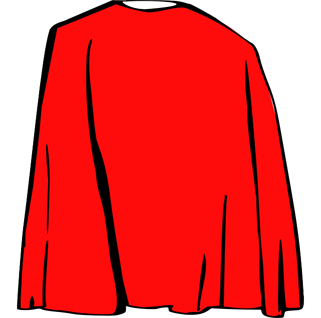
Cloak
The Djinn asked the camel why did he hear that he was not doing any work. The camel did not reply but continued to look at his reflection.
The Djinn sat down with his chin in his hand as an expression of thinking.
The Djinn continued and said that the camel had made the three animals work extra since Monday morning because he was idle. After saying this, again the Djinn continued thinking, with his chin in his hand. Maybe the Djinn was thinking about how to punish the camel and make him work.
The camel, as usual, replied "Humph" to everything that the Djinn said.
The Djinn told the camel that he wouldn't say the word "Humph" again if he were the camel. This was used as a warning to the camel to stop repeating "Humph" for everything. The Djinn's tone had presumably become serious. The Djinn added that he said "Humph" for everything and that he wanted him to work.
But the camel said "Humph" again. The camel immediately saw that his back was puffing up into a great hump, in the reflection in the water. He had been so proud of his back. But now it looked like a huge hump.
The Djinn asked whether the camel saw the hump that had formed on his back. He added that it was humph brought about by the camel himself because of not working. He pointed out that the camel had not done any work since Monday, and it was Thursday. He said the camel had to work now.
The camel asked how he could work with his humph on the back.
The Djinn answered that the humph had a purpose. Since the camel had missed work for three days, the humph will help him to store energy in the humph. Therefore the humph also had an advantage - the camel can work for three days without food now. The Djinn also said that the camel could not complain that the Djinn did not do anything for him. He told him to come out of the desert and meet the three animals - ox, horse and dog. He asked the camel to behave - it meant no more "humph-ing", and being sincere in duty and not dodging his work.
The camel went off to meet the three animals. So this is the story of how the camel got the humph - it always wears the humph (it is called as "hump" now - so that the camel's feelings are not hurt). But till date, the camel has not completed the three days work that he had missed at the beginning, nor has he learnt to behave, according to the author, Rudyard Kipling.
Glossary of difficult words:
Words | Meanings |
| cloak | a large outdoor garment that hangs loosely from the shoulders |
| cud | partly digested food that animals bring back from the stomach and chew further |
| fetch | go for and bring back |
| howling | produce a long wailing sound |
| humph | deal with him appropriately (here) |
| panchayat | a village council, to discuss problems and arrive at a fair solution |
| plough | turn up the soil, especially for farming |
| prickles | small thorns found on plants |
| saddle | a seat fastened in the back of a horse or other animal for riding |
| stroke of work | no work, any work at all |
| trot | run with short steps |
| whew | exclamation used to express surprise, relief or a feeling of being very hot or tired |
| yoke | a wooden crosspiece that is fastened over the necks of two animals and attached to the plough or the cart they are to pull |